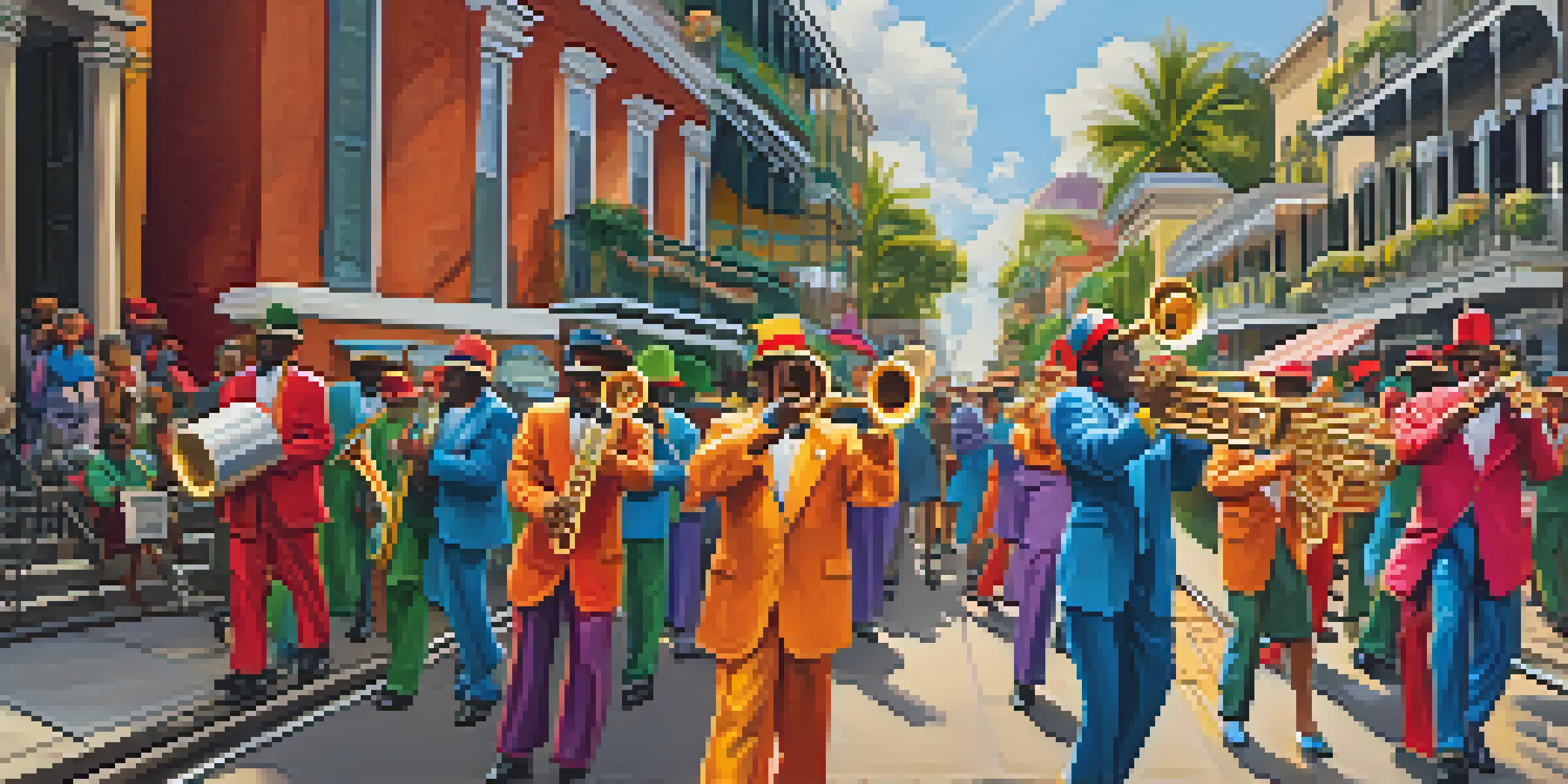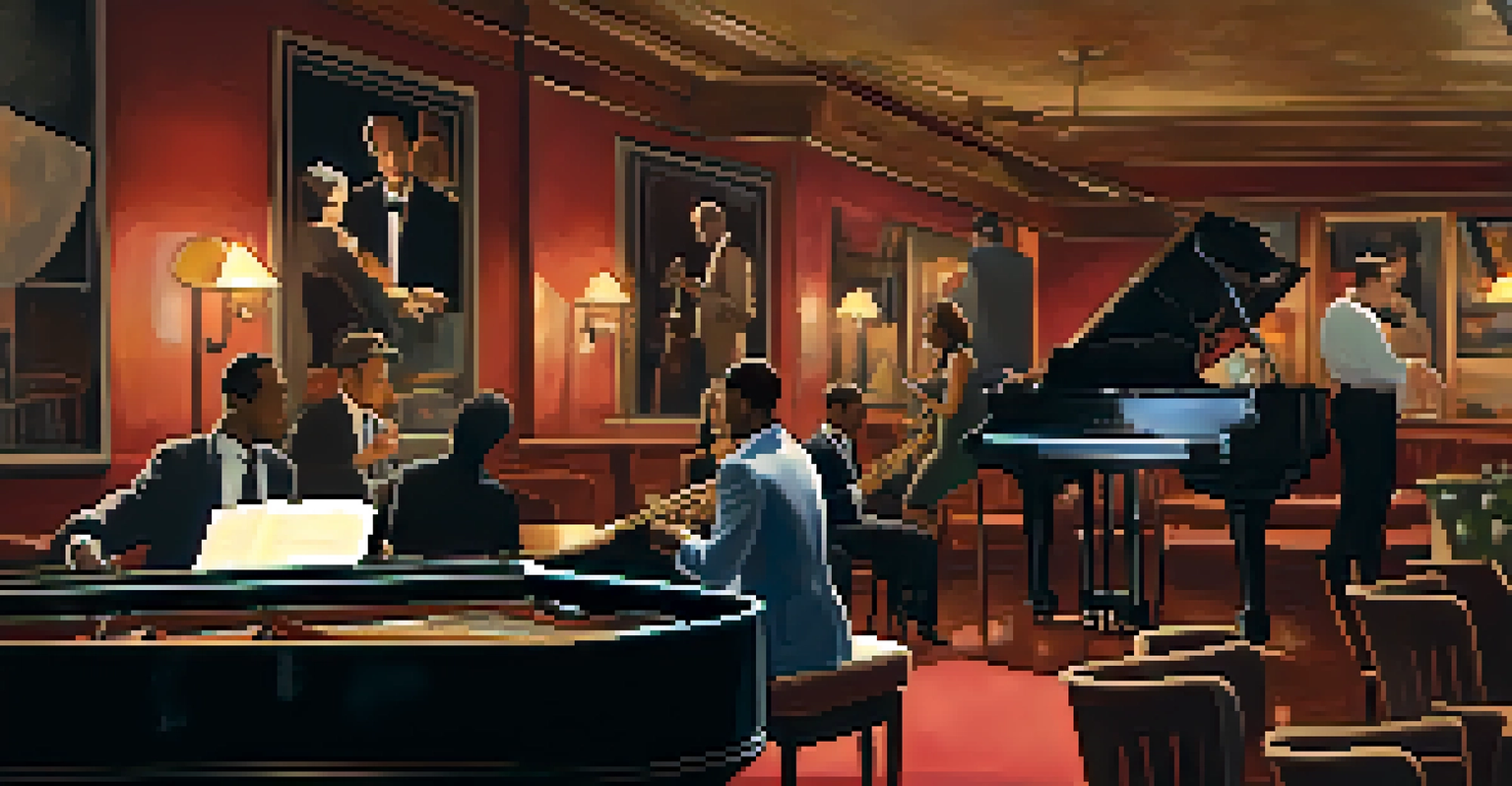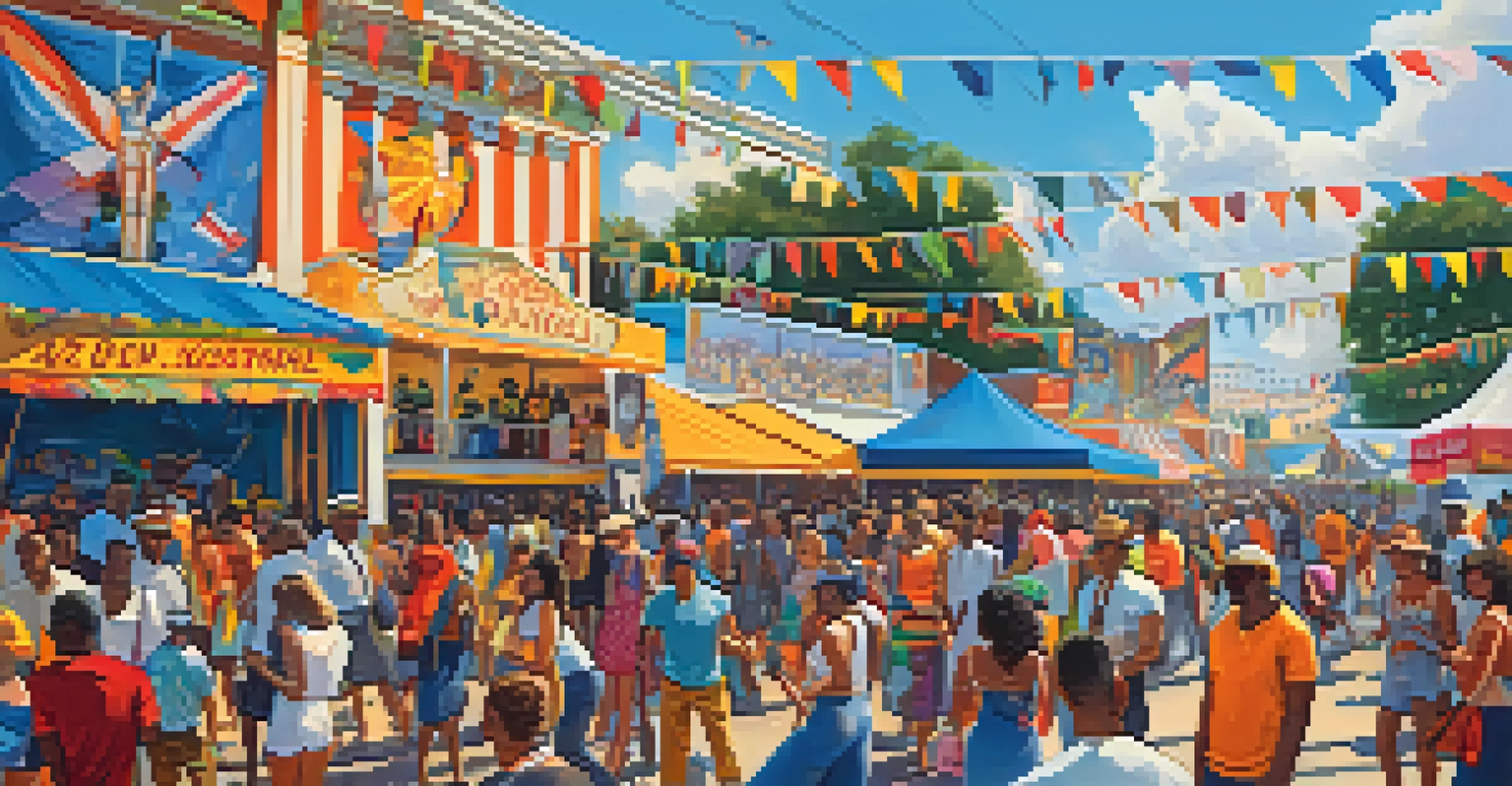Jazz and the Birth of Music Culture in New Orleans

The Birth of Jazz: A Melting Pot of Sounds
Jazz originated in New Orleans in the late 19th and early 20th centuries, combining various musical styles such as blues, ragtime, and brass band music. This vibrant city, rich in cultural diversity, provided the perfect backdrop for these genres to merge and evolve. African rhythms and European harmonies danced together, creating a sound that was both new and exciting.
Jazz is the only music in which the same note can be played night after night but differently each time.
In New Orleans, the streets were alive with music, reflecting the city's unique social fabric. Musicians played in parades, clubs, and throughout neighborhoods, making jazz an integral part of daily life. This communal atmosphere fostered creativity and innovation, allowing jazz to flourish.
The improvisational aspect of jazz set it apart from other musical forms, encouraging musicians to express their emotions and individuality. This freedom of expression resonated deeply with the people of New Orleans, leading to the genre's explosive growth and popularity.
Key Figures in the Evolution of Jazz
Some of the most influential jazz musicians hailed from New Orleans, shaping the genre's development. Louis Armstrong, for instance, not only popularized jazz but also transformed trumpet playing with his innovative techniques and unique voice. His charisma and talent brought jazz to a wider audience, paving the way for future artists.

Another significant figure was Jelly Roll Morton, known for his contributions to jazz composition and piano performance. Morton blended various styles, showcasing the versatility of jazz and proving that it could transcend simple entertainment to become a sophisticated art form.
Jazz: A Cultural Fusion
Jazz originated in New Orleans, blending African rhythms, blues, and ragtime, creating a unique sound reflective of the city's diverse cultural heritage.
These musicians, along with many others, created a legacy that would inspire generations. Their commitment to pushing boundaries and exploring new sounds helped establish jazz as a cornerstone of American music culture, rooted in the heart of New Orleans.
The Influence of New Orleans' Culture on Jazz
New Orleans' rich cultural heritage significantly influenced the evolution of jazz. The city's history, marked by a mix of African, French, Spanish, and Creole cultures, provided a unique backdrop for musical innovation. This blend of traditions fostered a spirit of collaboration that was essential to the development of jazz.
If you have to ask what jazz is, you'll never know.
Street festivals, parades, and social gatherings became essential venues for jazz musicians to showcase their talents. The lively atmosphere encouraged spontaneous performances, allowing musicians to connect directly with their audience. This interaction helped shape the sound and style of jazz, making it deeply rooted in the local culture.
The sense of community in New Orleans played a crucial role in nurturing jazz. Musicians often collaborated with one another, sharing ideas and techniques that enriched the genre. This communal approach helped jazz evolve continuously, reflecting the dynamic and ever-changing spirit of the city.
The Role of Clubs and Dance Halls in Jazz Growth
Jazz found a welcoming home in the clubs and dance halls of New Orleans, where people gathered to enjoy music and dance. Venues like the famous Preservation Hall became iconic spaces for jazz performances, attracting both locals and tourists alike. These establishments not only provided a platform for musicians but also fostered a sense of community among jazz enthusiasts.
In these vibrant settings, jazz musicians could experiment with their craft, allowing for the genre's natural evolution. The energy of the crowd often inspired musicians to push their limits, resulting in innovative performances that captivated audiences. This interaction between performers and listeners was crucial for jazz's development.
Impact of Key Jazz Figures
Influential musicians like Louis Armstrong and Jelly Roll Morton played pivotal roles in shaping jazz, pushing its boundaries and elevating it to a respected art form.
Moreover, these clubs and dance halls served as meeting points for diverse cultures, further enriching the jazz experience. People from different backgrounds came together to enjoy the music, creating a melting pot of ideas and influences that shaped the genre's future.
The Legacy of Jazz Festivals in New Orleans
New Orleans is home to some of the most famous jazz festivals in the world, celebrating the genre's rich heritage. The New Orleans Jazz & Heritage Festival, for instance, showcases not only jazz but also various forms of music that reflect the city's cultural diversity. This annual event attracts thousands of visitors, creating a vibrant atmosphere filled with music, food, and art.
These festivals play a crucial role in preserving and promoting jazz culture, providing a platform for both established and emerging artists. Musicians can share their talents with a wider audience, while festival-goers can experience the essence of New Orleans' musical identity. This exchange helps keep the spirit of jazz alive and relevant.
Additionally, the festivals foster a sense of pride in the local community, reminding residents of their rich musical heritage. They celebrate the unique sounds of New Orleans, ensuring that jazz remains a vital part of the city's identity for generations to come.
Jazz's Influence on Other Music Genres
The impact of jazz extends far beyond its own genre, influencing countless other musical styles. Genres like rock, pop, and hip-hop have all been shaped by the rhythms and improvisational elements of jazz. This cross-pollination of ideas has resulted in an ever-evolving musical landscape, reflecting the dynamic nature of modern music.
For instance, artists like Chuck Berry and Elvis Presley incorporated jazz elements into their rock and roll sound, creating a new wave of music that captivated audiences. Similarly, hip-hop artists often sample jazz tracks, blending the two genres to create innovative beats and lyrical flows.
Jazz's Ongoing Influence
The genre has significantly influenced rock, pop, and hip-hop, showcasing its versatility and enduring relevance in the ever-evolving music landscape.
This fusion of styles demonstrates the versatility and enduring appeal of jazz. As musicians continue to experiment and draw inspiration from the genre, jazz remains a foundational element in the ongoing evolution of music.
The Future of Jazz in New Orleans and Beyond
As jazz continues to evolve, new generations of musicians are emerging to carry the torch. In New Orleans, young artists are blending traditional jazz with contemporary influences, ensuring that the genre remains fresh and relevant. This innovative spirit keeps the music alive, attracting new audiences and fostering appreciation for its roots.
Music education programs in local schools and community centers also play a vital role in promoting jazz. By teaching young musicians about the genre's history and techniques, these programs help cultivate a new wave of talent. This commitment to nurturing future artists ensures that jazz will continue to thrive in the years to come.

Ultimately, jazz's ability to adapt and transform is what makes it a timeless genre. As it weaves its way through the fabric of modern music, the legacy of New Orleans and its vibrant cultural heritage will always be at its core.